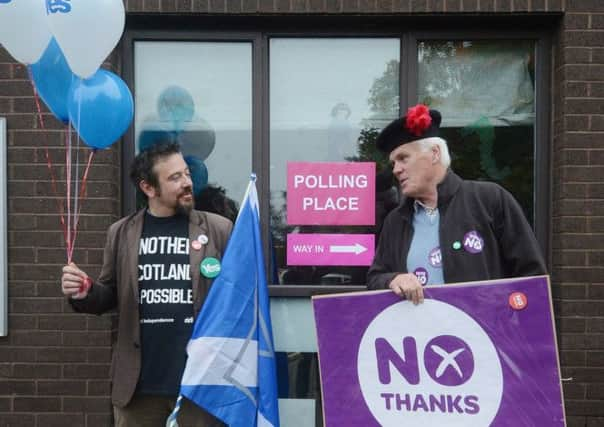Councils use referendum roll to find tax-dodgers


The referendum saw an unprecedented 97 per cent of those eligible across Scotland sign up for the vote – many of them registering for the first time in years.
But now council chiefs in Edinburgh and other parts of Scotland are trawling through the electoral roll in a bid to track down people with arrears for council tax and its predecessor, the controversial poll tax, introduced by Margaret Thatcher in 1989 but scrapped four years later.
Advertisement
Hide AdAdvertisement
Hide AdEdinburgh is estimated to be owed around £50 million in council tax arrears and £70m in unpaid poll tax.
It is widely believed many people dropped off the electoral register in a bid to avoid the poll tax, officially known as the community charge, which was a flat-rate tax on every individual – famously attacked for charging “the dustman the same as the duke”.
As well as those who could not afford to pay, a mass non-payment campaign was waged against the poll tax under the slogan “Can pay, won’t pay” in protest at what was seen as an unjust charge.
An estimated £300 million is still owed in poll tax debts to councils throughout Scotland.
Advertisement
Hide AdAdvertisement
Hide AdA record 377,413 people in Edinburgh registered to vote ahead of the September 18 referendum. Across Scotland the figure was almost 4.3 million.
Now councils have been urged to take advantage of the data to chase up arrears.
Although councils cannot pursue debts that are more than 20 years old, the period is extended by a further two decades is a warrant has previously been issued to collect unpaid bills.
A city councils spokeswoman confirmed Edinburgh would pursue debtors through the newly updated electoral roll. She said: “The council uses all the data available to it to collect outstanding debts.”
Advertisement
Hide AdAdvertisement
Hide AdBut Scottish Green co-convener Patrick Harvie accused those using the electoral register to pursue people with arrears of planning to “punish marginalised communities for having the nerve to express themselves at the ballot box”. He said: “We’ve finally seen huge numbers of people rejoin the electoral register after decades of mistrust following the poll tax and I’m dismayed that the Tories or anyone else should want to turn electoral registration once more into a way of policing people.
But Alex Johnstone, Scottish Tory welfare reform spokesman, backed the move to chase up old tax debts.
He said: “Councils should do everything in their power to detect those who are evading council tax payments.
“If that means going through the electoral roll with a fine tooth-comb, so be it.
Advertisement
Hide AdAdvertisement
Hide Ad“Local authorities are under extreme pressure to live within their means and council tax avoidance makes that even harder.
“It is also hugely unfair on the vast majority who play by the rules and pay their council tax on time and in good faith.”
A spokesman for the Convention of Scottish Local Authorities also backed the move. He said: “Every pound of debt collected is a pound for frontline services. Councils do not write off debts.”